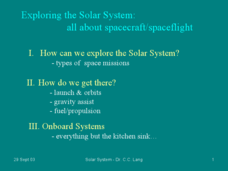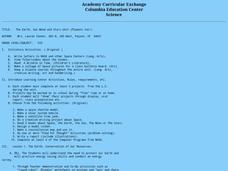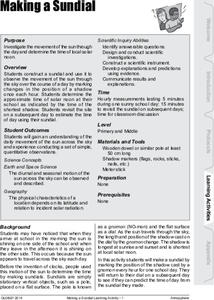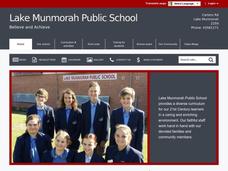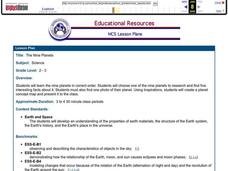Curated OER
Solar System Hall Model
Not novel, but fun, this activity gets your space science learners to model the size of the planets and the solar system along your school's hallway. Scaled measurements as well as actual distances are provided for both planet diameters...
Curated OER
Crossword: Solar System
For this crossword worksheet, learners complete a crossword puzzle by solving clues about the solar system. For example, "All nine planets can be seen through a..."
Curated OER
Planets in Our Solar System
Each member of a four-student group takes on a specific aspect of an assigned planet to research. After gathering information, the team works together to create a travel brochure and a presentation intended to convince other classmates...
Curated OER
Exploring the Solar System: All About Spacecraft/Spaceflight
Rarely do you find resources that reach high school astronomy learners. Here is something at their level! The physics of flyby missions is explained via several examples. Landing, penetrating, and roving spacecraft are examined. Diagrams...
Curated OER
Planets on Parade
Review all of the planets in our solar system with this informative PowerPoint. Each planet is listed on its own slide, accompanied by facts and an image. There are three multiple choice question listed at the end of the presentation.
Curated OER
Solar System Lab
In this solar system worksheet, 8th graders make a scale model of the solar system, answer 5 questions and write a conclusion.
Curated OER
The Earth, Sun, Moon, And Stars
Fifth graders explore the solar system. In this solar system unit, 5th graders investigate numerous projects while rotating through learning centers. Students write about space and construct a space shuttle model. Students practice map...
Curated OER
Moon
Students discover scientific facts about the Moon and how
some American Indian Tribes used the moon to measure time.
They accomplish this by listening to stories and poetry, writing
stories, communicating with an astronaut,...
Curated OER
Phases of the Moon
Students use a simple physical model of the Earth, sun, and moon to understand why the moon changes phases from the perspective of Earthly observers. They hold up balls representing the moon in a room with a single light source to see...
Curated OER
Working on the Moon
Students take a mission to the moon. In this space science lesson, students visit selected websites to discover information about Earth's moon and the solar system. Students may take virtual missions to the moon and share information...
University of Colorado
Clay Planets
Why do scientists use models? In the first installment of 22, groups create scale models of our solar system. They then share and discuss their models.
GLOBE Program
Making a Sundial
Sundials are more than just primitive clocks. Learners build their own sundials to study the location of the sun across the sky throughout the day. They use shadow evidence related to their sundials to make conclusions about solar movement.
Curated OER
Earth Rotation
Students examine the rotation of the Earth as it occurs in the 24 hour cycle. They use models of planets and the globe to make observations of movements made. Students brainstorm prior knowledge and then participate in a demonstration of...
Curated OER
Our Solar System
In this solar system worksheet, students complete a database comparing the 9 different planets' mass, surface temperature, rotation period, orbital period, moons, and distinguishing features. This worksheet is a graphic organizer.
Curated OER
Solar System and Planets
Students identify the main components of the solar system. For this earth science lesson, students order the planets according to their distances from the Sun. They differentiate planets from dwarf planets.
Curated OER
Voyage: A Journey through our Solar System
Learners build the Voyage scale model of the Solar System on a playground and "travel" to each planet. They recognize that the Sun and planets are tiny worlds in a vast space, giving them a new perspective on the Solar System, and...
Curated OER
Phase to Phase with the Moon
Fourth graders study the Moon phases. The instructional activity includes hands-on activities as well as web-based activities. They use models of the Moon and a lamp to study each of the phases of the Moon, and test their knowlege of the...
Curated OER
The Solar System Cloze Activity
In this cloze activity instructional activity, learners read the passage about the Solar System. Students use the 14 words in the word bank to help them complete the passage.
Curated OER
The Solar System: Go Green with the Sun!
Third graders learn how to use solar power. In this sun, technology and energy instructional activity, 3rd graders learn how the solar power from the sun can give off energy, learn about solar panels, discuss their uses and benefits,...
Curated OER
Origins: Earth Is Born
Students develop a timeline of all the major events involved in the formation of the Earth and the emergence of humans. In groups, they focus on a specific topic by watching a PBS program and taking notes. After the video, they list...
Curated OER
Our Solar System and Seasons
Sixth graders investigate the relative diameters of planets and distances between them and the cause for seasons on Earth using the 5-E Learning Model. They appreciate the size and distances involved with objects in the real universe....
Curated OER
Why is There a Tidal Bulge Opposite the Moon?
Students simulate how the Moon causes ocean tides. In this earth science lesson, students calculate gravitational acceleration using a mathematical formula. They compare the force of attraction between the Earth, Moon and Sun system.
Curated OER
Solar System Alphabet Activity
In this solar system worksheet, 3rd graders explore the parts of the solar system. Students are given twenty-five words that relate to the solar system and are to put the words in alphabetical order.
Curated OER
The Nine Planets
A solid lesson on teaching the nine planets in our solar system is here for you. In it, young scientists learn the correct order of the planets, and they choose one of the planets to do a research report on. They must come up with five...





